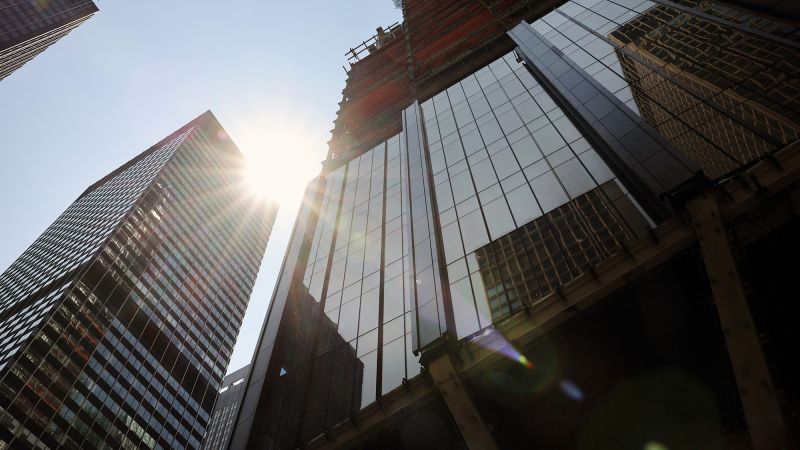A version of this story first appeared in CNN Business’ Before the Bell newsletter. Not a subscriber? You can sign up right here. You can listen to an audio version of the newsletter by clicking the same link.
The biggest banks in the world have pledged to go green. But a new study, published by the European Central Bank, has found that those promises often amount to more talk than walk.
What’s happening: Just over two years ago, the world’s largest lenders and asset managers gathered in Glasgow and pledged to spend a collective $130 trillion (that’s nearly five times larger than the US economy) to tackle climate change. What emerged was the Glasgow Financial Alliance for Net Zero (GFANZ) – now made up of 675 financial powerhouses spanning 50 countries.
“We now have the essential plumbing in place to move climate change from the fringes to the forefront of finance so that every financial decision takes climate change into account,” Mark Carney, the alliance co-chair, UN Special Envoy for Climate Action and former head of the Bank of England, said in a statement at the time.
The financial institutions voluntarily pledged to make sure that the companies they invested in slashed their emissions. They also said they would align their lending policies with the goal of limiting global temperature increases to 1.5°C from pre-industrial levels.
But a new report that analyzed lending by some European signatories, published by economists from the ECB, MIT and Columbia Business School, casts doubts on whether the promises had made any substantive changes.
“Our results cast doubt on the efficacy of voluntary climate commitments for reducing financed emissions, whether through divestment or engagement,” they wrote in their report.
About 10% of the 300 banks the study analyzed had joined the Net-Zero Banking Alliance (a group led by GFANZ and backed by the United Nations).
They found that banks in the alliance did not increase interest rates on loans to companies with high carbon emissions and the companies receiving loans from banks in the alliance were not more likely to set goals for decarbonization.
Since 2018, they found, European banks had reduced their lending by just 20% to carbon-heavy sectors like oil, gas and transport.
Researchers found that the decline was the same for all banks, regardless of whether they signed onto the commitment.
GFANZ declined to comment, but a BloombergNEF research report that showed that banks in the Net-Zero Banking Alliance deployed a much greater percentage of their finance into clean energy than banks that weren’t in the alliance.
Leaving the group: The study comes at a time when some large banks are pulling out of high-commitment climate pledges and Republican backlash grows against investing strategies that evaluate stocks using environmental, social and governance factors.
The insurers’ climate alliance, another group under GFANZ, lost nearly half of its members last year as a group of Republican attorneys general accused the insurers of potentially breaking US antitrust laws.
JPMorgan Chase and State Street quit Climate Action 100+, an investor-led climate change initiative, last year.
“The climate challenge is immense and complex,” said JPMorgan CEO Jamie Dimon in his annual letter to shareholders this week. “Addressing it requires more than making simplistic statements and rules.”
Dimon said JPMorgan erred when it used the word “commitment” instead of “aspirations we are actively striving toward.”
“While we don’t necessarily disagree with some of the principles many organizations have, we make our own business decisions,” he added, noting JPMorgan has invested in its own in-house climate team.
State Street did not immediately respond to CNN’s request for comment.
Climate experts expect that over $5 trillion must be invested into climate action annual to meet current goals.
From central banks to Costco customers, it seems everyone is buying gold these days, reports CNN’s John Towfighi.
The price of spot gold reached $2,364 per ounce Tuesday after hitting record highs for seven straight sessions and trading at $2,336 per ounce Monday. Year on year, gold is up 16.5%.
Investors who expect the Federal Reserve to cut its benchmark interest rate are the main force driving up prices, but the surge is boosted by other factors, including central banks — led by China — buying up gold to ease reliance on US dollars.
Central banks see gold as a long-term store of value and a safe haven during times of economic and international turmoil.
Gold is considered a resilient investment. When interest rates fall, gold prices tend to rise, as bullion becomes more appealing than income-paying assets like bonds. Investors also regard gold as a hedge against inflation, betting bullion will retain its value when prices rise.
The People’s Bank of China bought gold for the 17th straight month in March, adding 160,000 ounces to bring reserves to 72.74 million troy ounces of gold, according to Reuters.
Central banks may want to “diversify away” from US dollars and buy gold amid geopolitical uncertainty, according to an April 9 UBS research note. As China builds its reserves, demand is pushing up prices already boosted by usual investors.
Chinese investors are looking to gold as an alternative asset amid downturns in property valuations and equity prices in past years, according to an April 9 Capital Economics research note.
Other central banks, including India and Turkey, are also increasing their gold reserves. India’s GDP growth is driving those purchases, according to UBS.
Read more here.
Jessica Alba is stepping down as chief creative officer at The Honest Company, the baby products and personal care business founded by the actress in 2012, reports my colleague Ramishah Maruf.
In a statement Tuesday, the company said Alba’s move away from her position will allow her to “shift her creative energy to new endeavors.” The actress, known for her roles in “Fantastic Four” and “Good Luck Chuck,” will remain on The Honest Company’s board of directors.
The Honest Company posted a strong fourth quarter in March. Its revenue increased 10% to $90 million, according to the company’s earnings report, driven by growth in its digital channel and price increases. The earnings report said its diaper and baby clothing businesses performed especially well.
Still, shares of the stock are down more than 80% from their market peak in 2021. The company is not profitable, and reported a net loss of about of $39 million in 2023.
The company — which went public and began trading on Nasdaq in 2021 — markets an aspirational “clean” lifestyle through its baby products and clothing, as well as skin and personal care.
Read the full article here




